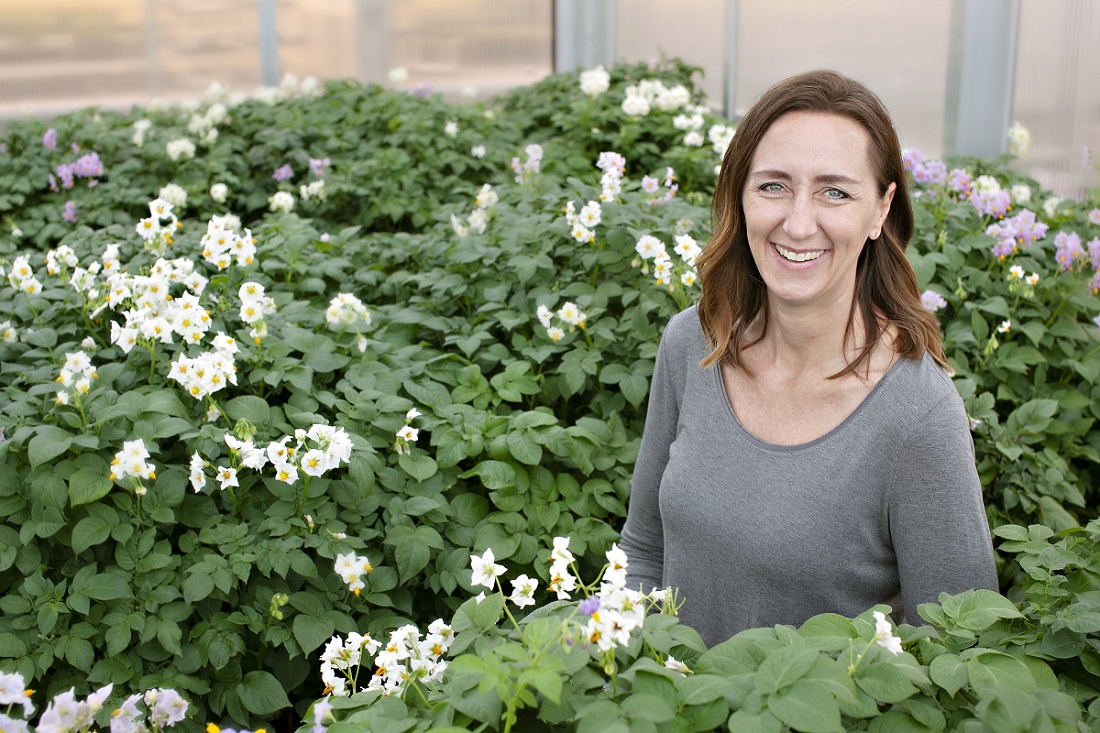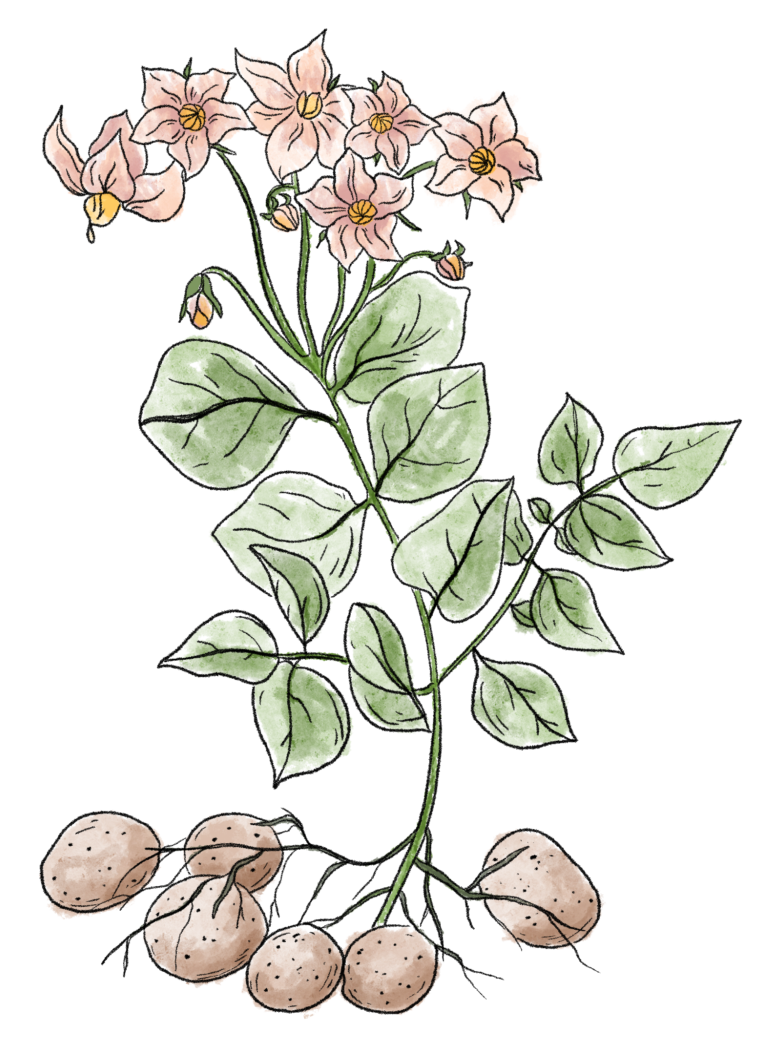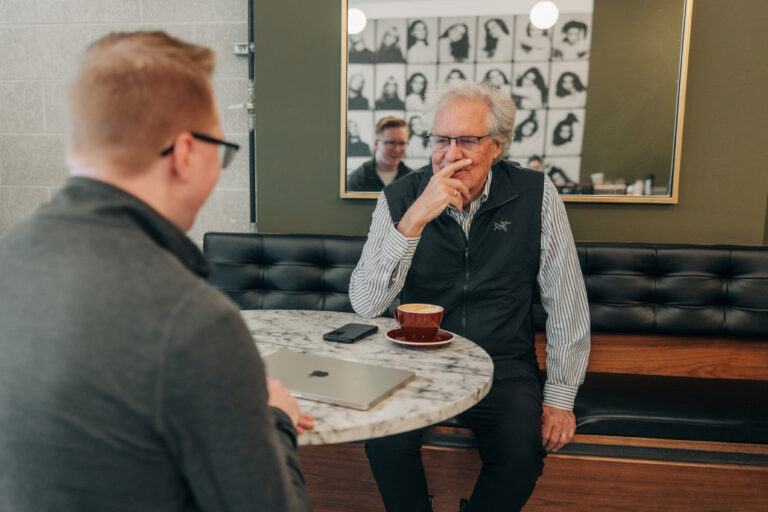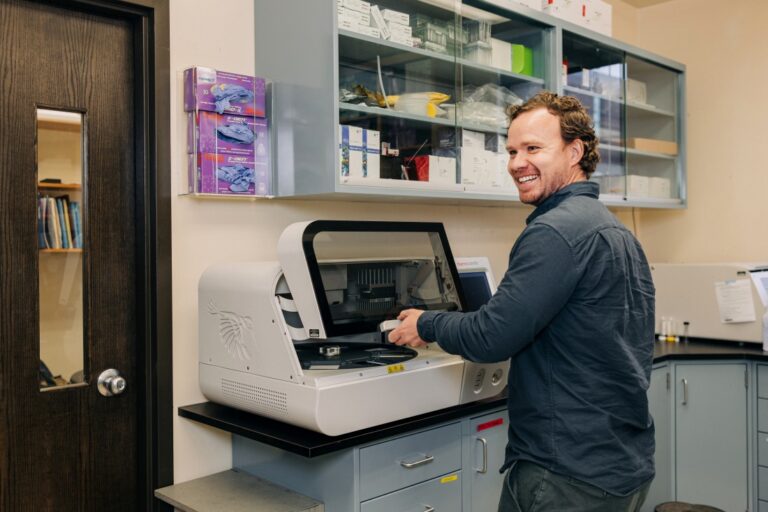Dr. Bill Wilson ’75 leverages his international network to create connections between students and the industry.
Read MoreMeet the Faculty: Dr. Julie Pasche
Neil C. Gudmestad Endowed Chair of Potato Pathology
By Nicole Thom-Arens | Illustration by Leah Ecklund | September 28, 2021

If asked to envision a potato, what do you see? A side of fries next to a burger? A mound of mashed spuds accompanying meatloaf? Maybe you’d see boiled baby Red River Valley Reds sprinkled with parsley next to grilled chicken? If breakfast is your jam, the word might inspire visions of hash or a skillet packed with cubed potatoes, peppers, and onions topped with an over easy egg. The versatility of the potato is vast, and in the upper Midwest, foodies continue to explore new ways to transform the humble root vegetable into something extraordinary. For many, it is difficult to imagine a balanced meal without them, and researchers in potato pathology at NDSU are working to ensure one never has to.
Seven-and-a-half years ago, the NDSU Foundation and Dr. Neil C. Gudmestad ’78, ’82 worked with benefactors to establish NDSU’s first endowed chair — the Neil C. Gudmestad Endowed Chair of Potato Pathology — which supports “the exclusive efforts of those who will work on the causes, diagnosis, effects, and/or management of diseases of economic importance on the potato industry.” At the time of fundraising for this endowed position, Neil was a university distinguished professor of plant pathology at NDSU. As a researcher, he was dedicated to helping manage potato diseases — not just in North Dakota but across the U.S. and around the world. His long service of research, teaching, and outreach is legendary.
By the mid-2000s, acreage of potatoes in North Dakota had decreased, and Neil left a State Board of Agricultural Research and Education meeting with the overwhelming sense that the future of potato pathology research at NDSU was in jeopardy. Legislators were questioning the investment of two potato pathologists at NDSU since potatoes were a dwindling commodity in the state. Neil knew then that endowing his position would help secure it in the future and ensure critical potato research would continue long after his retirement. His efforts to secure funding were expedited when he learned he had cancer and faced only a 12% chance of survival after five years. More than 40 donors across 15 states rallied behind Neil and the funding for the chair position came together in 2014. Fast-forward to winter 2020 — Neil’s cancer was in remission, and he was ready to retire knowing it was time to pass NDSU’s first endowed faculty position on to the next researcher who could continue his work and grow it.
“The concern was always, who would replace me?” Neil recalled. “I oversaw the largest potato pathology program, under one person, in the world and the committee wanted my successor in place a year prior to my retirement.”
Enter Julie Pasche ’93, ’03, ’12. Julie started working with Neil in 1995 as a full-time microbiologist studying bacteria of potatoes. She attended NDSU as an undergraduate majoring in microbiology and biotechnology while she played volleyball. While working full time and raising a family, Julie continued her education, earning her master’s and Ph.D. under Neil’s direction.
“I didn’t have a background in agriculture,” Julie said. “After I started working with Neil, his group, and the growers, I realized agriculture is much different than I knew. There are a lot of challenges and a lot of great people to work with. As a scientist, I think that’s what you look for — opportunity — and all of those things were in agriculture for me.”
At the time of Neil’s retirement, Julie had been working with pulse crops and dried beans, but she welcomed the opportunity to return to potato research. The endowment advisory committee wanted Julie to be Neil’s successor, too. Because of her long tenure working alongside Neil, they were confident she would steward Neil’s work and lead the research into the future.
“Julie was the face of the program early on,” Neil said. “When I couldn’t be somewhere, Julie presented on my behalf. She knew the program, how it was run, and she knew the people. Julie brings an intensity to everything she does; she is superb.”

“It’s a lot,” Julie said regarding the honor of holding the endowed chair position. “Philanthropy reflects the excitement around an institution and can really move places like NDSU to the next level. The endowed chair position opens us up to thinking outside the box to expand what we are doing to new areas.”
Julie and the team continue asking critical questions about where to take risks while evaluating what they’re seeing in the field. She also balances expectations of those who invested in the position and maintain donor intent.
“We’re trying to protect yield and working toward doing it in a sustainable manner, and we want benefactors and growers to feel like they are getting value from their investment,” Julie said. “My role is managing the research unit. The lab scientists and field scientists are doing the boots-on-the-ground work, and I’m bringing it all together from what the growers need to funding and distributing the results of the research.”
The research being conducted by Julie’s team is critical to potato yield globally, and investigating how growers can produce safe food sustainably while continuing to feed the world guides their processes.
So, what is Julie’s go-to way to enjoy potatoes?
“My favorite thing to do is put them on the grill,” she said. “The potato industry in North Dakota and Minnesota originated in the Red River Valley. We’re known for the deep soil color here; we’re known for growing really high-quality red potatoes.”
Share This Story
Related Stories
Agriculture’s Miracle Bacteria
With support from Richard '65 and Linda Offerdahl, NDSU researchers are working toward a new evolutionary event that will reduce the cost...
Read More
